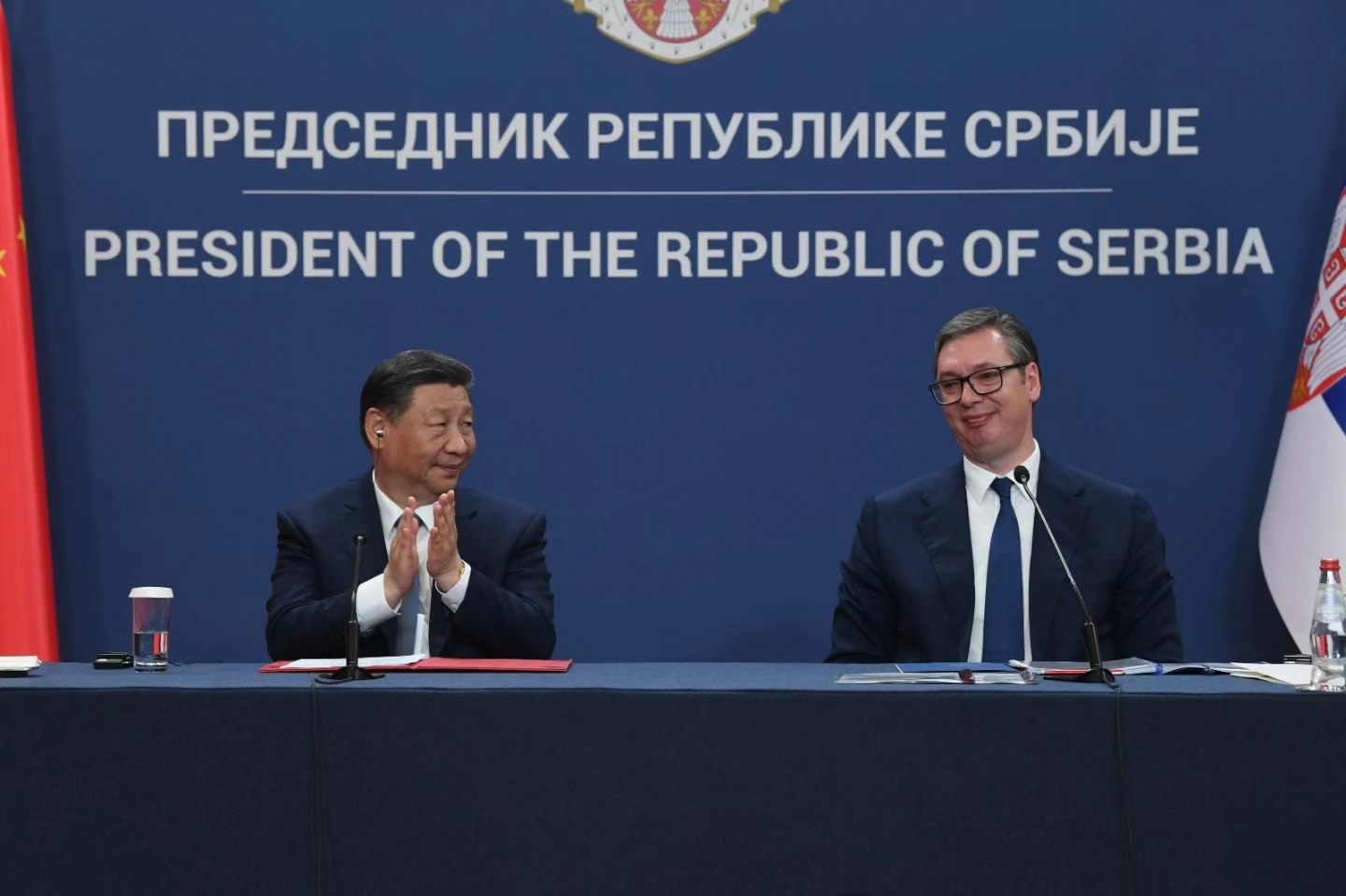Chinese President Xi Jinping on May 7-8 paid a visit to Serbia. It has been eight years since the last visit of the Chinese leader. And he was welcomed truly pompously, after all those invitations and waiting. The welcoming routine was so extensive that it made some Serbian observers recall Tito’s socialist Yugoslavia.
However, the Yugoslav past has to be mentioned not only because of the facade of the visit, but also because of its content.
Pathos a la Yugoslavia
In the Serbian press, Xi Jinping was referred to as “The greatest world leader”, and extensive preparations had been made for meeting the president long in advance. For some reason, the exact time of the arrival of Xi’s presidential delegation remained unknown to the Serbian side up until the last moment. Perhaps everything depended on the progress of talks in France, from where the Chinese leader moved on to the Balkans. According to another version, it was all about security protocols.
“There have been talks about his arrival since early morning, but it seems that an unhealthy security situation has developed in Serbia, so the time of his arrival is concealed,” Serbian journalist Misha Brkic said in an interview with N1.
The welcoming group waited for the Chinese leader for several hours, accompanied by live TV broadcasts from the expected route of the motorcade and reports of heightened security measures. Some 4,500 police officers were deployed to ensure public order. Media separately noted an air escort provided for the Chinese delegation: their plane was accompanied by Serbian MiG-29 fighter jets. It was reported that even Serbian President Aleksandar Vucic arrived to meet his Chinese counterpart a little earlier.
At the airport, folk bands and dancing teams performed for those who were there for a long wait.
In order to make the event even more solemn and to demonstrate the nation’s love for China, “workers” from different parts of the country were chartered to the capital of Serbia.
“I was expecting that children would be brought out of schools with Chinese flags to wave, but luckily it’s already almost evening. It all reminds me of the period in the 1960s and 1970s, when various Asian and African dictators would come to Serbia and we would be taken out on the streets to wave flags before them and be happy about it. This shows that the public is being deliberately fed with some random details about the visit so that it gains as much importance as possible,” Brkic said.
There were also some other circumstances of the arrival that were reminiscent of the Yugoslavia days. Xi’s visit was deliberately scheduled for May 7 due to a deep symbolism of the date. On May 7, 1999, the Chinese embassy was bombed during a NATO air raid. The incident was actively exploited both by the then leadership of Yugoslavia, led by Slobodan Milosevic, and by today’s politicians in Belgrade and Moscow to incite anti-Western sentiments.
A quiet anniversary
In 2016, during Xi’s first visit to the capital of Serbia, the commemoration of the victims of the airstrike was pretty much in the spotlight.
This year, on the eve of the Chinese leader’s European tour, Beijing posted an oped on behalf of Xi Jinping, a large portion of which was devoted to that bombing incident and once again stressed that it would never be forgiven or forgotten. So naturally, Russian and pro-Russian propagandists expected a massive anti-Western, primarily anti-American show.
But the reality turned out to be different. Xi’s plane landed late in the evening, and the top guest did not immediately go to the Chinese embassy’s former location. The next day, May 8, the topic was also skipped. Xi made not a single public statement in memory of the May 7 tragedy.
There may be several explanations.
The simplest one is that the visit was shorter than expected due to the France delay. Although nothing stood in the way of commemorating victims the next day after arrival.
Another explanation is more complex and is related to the current security situation on the European continent and China’s current foreign policy vector.
The events of the distant 1999 are perceived today against the background of a full-scale war raging in Ukraine. In this regard, many recall the Russian bombing of Odesa in the summer of 2023 that damaged China’s Consulate. The reaction from the Chinese side, or rather the lack thereof, was rather telling. This means Beijing decided not to escalate relations with Russia, no matter what.
Thus, Xi’s current stance to the 1999 Belgrade bombing during this visit to Serbia may be due to him not willing to worsen relations with the West.
However, the explanation may be different – Xi might not be willing to shift focus and divert attention from the main goal of the European tour, which China’s leadership believes is about building a “global community of one destiny”.
A community of one destiny
During Xi’s visit, China and Serbia decided to create a “community of one destiny”, raising bilateral relations to a new level, which should exceed the strategic partnership established in 2016.
According to Sinology experts, the term “Community of One Destiny” is an initiative put forward by Xi Jinping in 2015 at the 70th UN General Assembly. Its essence describes in several theses the Chinese vision of building harmony and peace around the world. Here are just a few quotes from the official statements explaining the concept:
“The peoples of all countries should undertake joint efforts to build a community with a common destiny for mankind, to create such a beautiful reality where peace, common security, common prosperity, openness and inclusiveness, as well as clean environment, prevail.”
“We must respect each other, hold equal consultations, and resolutely abandon the Cold War mentality and power-backed policies. New approaches based on dialogue and partnership, rather than confrontation and bloc thinking, should be applied to interstate relations. Disputes and disagreements should be resolved through dialogue and consultation.”
“All countries are equal while big, strong, and wealthy should not insult, oppress, and tread on the small, weak, and poor. The principle of sovereignty means not only that the sovereignty and territorial integrity of all countries are inviolable, but also that no one has the right to interfere in the domestic affairs of others. It also means that it is necessary to defend the right of all countries to independently choose their social system and path of development, as well as to respect practical efforts of all countries to ensure economic and social development and improve people’s living standards.”
In fact, it is about China’s attempt to build a union of non-aligned nations that should independently make decisions about their foreign or domestic policy, without heeding to pressure or claims from other states or interstate alliances.
It remains unclear how Serbia sees itself in this concept as the nation is now on the path toward the European Union and is obliged to introduce European integration reforms and coordinate its actions in the foreign affairs arena with EU policy.
Serbian beans in exchange for European market
As for Serbia’s economic cooperation with China, no special breakthroughs were expected, as all the projects launched in 2016 are being implemented according to plan, and the free trade zone has not yet been opened.
China is Serbia’s second largest trading partner after Germany. But if the foreign trade deficit with Germany stands at half a billion euros, it was EUR 3.4 billion with China last year.
Serbia hopes that the free trade agreement between Belgrade and Beijing, which will enter into force in July, should change things. According to President Vučić, the main goal is to sell more Serbian vegetables, fruits, liquor, and wine to the Chinese.
But some observers view such prospects with a grain of salt.
Serbian journalist Misha Brkic claims that from 2010 to 2023, Serbia borrowed from China a total of EUR 17 billion. “Due to this, in 2021 and 2022, they (Serbian government) were the world leaders in borrowing, involving loans from China, and I do not expect any new loans now,” he said. “As for trade, we have signed a trade deal with China. There is a lot of talk around it here, but they hide the fact that the agreement does not enter into force immediately, but shall be gradually adjusted over five years. I believe that Serbia does not have enough agricultural products to thrive in the Chinese market. We forget that this is a two-way deal and that China now has an open door to fill the Serbian market with its products, and I expect that there will soon be much more Chinese garlic in Serbia than Serbian beans in China,” the journalist assesses.
It is clear that Beijing is not interested in Balkan beans at all though. According to the Chinese government’s Belt and Road program, China must conquer and secure all promising sales markets, primarily European ones. And to this end, they need to control supply routes for Chinese goods to Europe. It is known that the authorities in the EU prefer to control their own market. Meanwhile, China’s task is making the markets in Europe accessible. Countries whose leadership is in opposition to EU policy to one degree or another can help China succeed. These are, first of all, Serbia, which is still outside the European Union, and Hungary, which is a member state. However, this cooperation will not be effective without reliable access to the sea.
Authoritarianism. Made in China
Another aspect of Xi’s visit, which was discussed by analysts across the region, was the topic of the possible “import” of authoritarian management techniques at the request of Serbian authorities.
It should be recalled that after Xi’s 2016 visit, Serbia purchased from China a massive CCTV-based surveillance system with face recognition technology. It can be used to fight terrorism, but also – for ensuring total control of citizens’ behavior.
A delegation from the ruling party went to China “for training”. The opposition is convinced that the Chinese comrades taught the Serbs some tricks from the traditional authoritarian toolkit.
Miša Brkić says that the transfer of China’s hi-end technology to Serbia, of which officials in Belgrade talk about, has been going on for more than 10 years, but that was about the political domain.
“Look, they posted news that a Chinese institute trained people from the ruling party administration skills. A few years ago, a large delegation from the Serbian Progressive Party visited China to be trained on how a single party can run the country. When our president talks about new technology transfer, I would like him to tell us what the transfer of administration tech from the Communist Party is all about.”
Weapons and geopolitical maneuvers
Not all results of the visit have been made public. In particular, the topic of Chinese arms deliveries to Serbia remained behind the scenes.
Just six months ago, the Serbian authorities boasted of purchasing from China an FK-3 air defense system, as well as warplanes and unmanned aerial vehicles, and announced continued Serbian-Chinese defense cooperation, but now suddenly the topic of armaments turned out to be irrelevant.
Security experts do not believe that cooperation in the military field was off of the agenda this time. However, most likely, the parties decided not to bring up the topic publicly because by buying Chinese weapons, Belgrade annoys not only Brussels or Washington, but also Moscow.
Following the visit, it is safe to say that Belgrade’s geopolitical compass now points more toward the East than the West. But it is somewhat paradoxical that, while gravitating toward Beijing, the arrow of Serbian foreign policy also deviated slightly away from Moscow. And this fact reminds us again of Tito’s times, when Yugoslavia used to execute some stunning geopolitical maneuvers, balancing between West and East.



